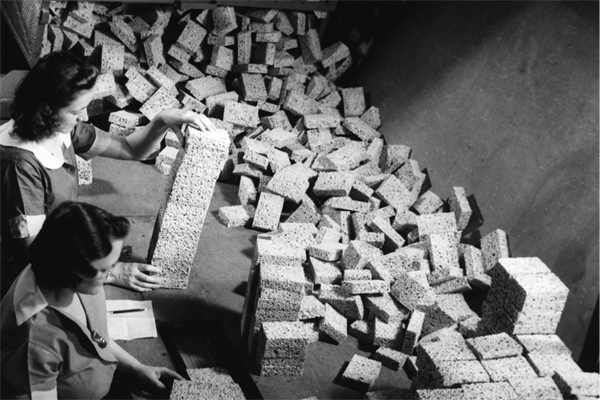THE SPONGE WAS COMMERCIALIZED IN BUFFALO
By Ben Rand

Did you know that WNY is the birthplace of the artificial sponge, that indispensable household item which continues to prove its worth even in this high-tech age?
The use of sponges dates to Roman times, when divers harvested natural sea sponges from the Mediterranean. In the 1940s a shortage developed in North America due to a combination of sponge blight and World War II, which cut off the Mediterranean supply and boosted military usage. This led DuPont and others to accelerate work on artificial sponges, which ultimately led to the cellulose sponge, a combination of wood pulp and vegetable fiber that was longer lasting and cheaper than sea sponge.
In 1946, three engineers—Gerald “Red” Murray, Chester “Chet” Hardt and Jack Bitzer—left DuPont in Buffalo to start a new company to manufacture sponges for the household market. They named the company O-CEL-O after the chemical formula for their sponge: Oxygen-Cellulose-Oxygen. The first O-CEL-O plant started out with only 3,000 square feet and a few employees on Leslie Street on Buffalo’s East Side. But the company grew quickly and by 1952 had $4 million in sales and almost 100 employees.
At that point, O-CEL-O was sold to General Mills whose deep pockets could support the company’s contin- ued expansion. Jack Bitzer stayed on with General Mills and participated in at least three more patents. Chet Hardt turned his attention to politics becoming a state assemblyman, chairman of the Niagara Frontier Transportation Authority and a close associate of Governor Nelson Rockefeller. Red Murray continued his entrepreneurial career by investing in various WNY business ventures, including U*C Coatings Corporation, located on Fillmore Avenue in Buffalo and now run by his son, Norm Murray.
Over the next 38 years, under General Mills’ ownership and Joe Grieco’s leadership, O-CEL-O grew to more than $46 million in sales and by more than 400 employees, with 250,000 square feet of manufacturing space at 305 Sawyer Ave. in Tonawanda. In 1990, 3M purchased O-CEL-O from General Mills and continues to invest in the business, constructing a new office building, distribution warehouse and adding new equipment and environmental controls. To this day, the Sawyer Avenue plant remains the world’s largest cellulose sponge manufacturing facility.
The O-CEL-O story is another WNY business success story based on innovation. It is also an early example of a WNY consumer products company, a category that today would include the likes of Rich Products, New Era Cap Company, Fisher-Price, Lornamead, Setterstix and TRS Packaging, among others.

